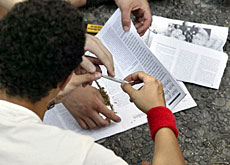The vicious circle of drug dependency

Hans B. is the kind of person cited by doctors as someone who might benefit from a trial cocaine prescription programme.
Hans – not his real name – is 37, has been a drug addict for ten years and is on Zurich’s heroin prescription programme.
He also gets Valium and Ritalin which, he says, helps him with attention deficiency, although the drug is also being tried as a treatment for cocaine addicts.
But despite all the drugs he receives legally from doctors, Hans cannot control his cocaine addiction.
Several times a week he is on the streets of Zurich looking for dealers who will sell it to him.
“It’s like something clicks in my brain,” he explained. “In the evening, all I can think about is cocaine.”
“So I go into Zurich, where there are plenty of people who sell it,” he continued. “And I buy a little ball of cocaine which costs SFr40. It’s just a little ball and is only good for one injection.”
Vicious circle
Hans says the cocaine makes him feel good for a short time, but afterwards he feels “sick and depressed” – which in turn makes him crave even more drugs.
Ten years ago he had a steady job and only took heroin and cocaine for recreational purposes.
“I used to cycle quickly into town to buy [the stuff]. I liked the cocktail, what we call speedballs.”
Neither his wife nor his young son knew anything about his habit. Hans is now separated from his wife, but he says that “drugs are not the reason we split up”.
Doctors maintain that those who take drugs recreationally are deluding themselves if they believe they are able to control their habit.
Debts and crime
Cocaine is a very addictive drug and unlike heroin – where there is a limit to how much even the most hardened addict can take – cocaine users tend to want to take more and more.
As a result they run up huge debts and their health deteriorates to the extent that they can no longer work and are often forced into crime as a way of paying for their habit.
A decade ago Hans had a steady job and a young family and played football in the first division of an amateur league.
Now he is unemployed, claims invalidity benefit, has no contact with his son and is thousands of francs in debt.
His plan, he says, is to get his multiple addictions under control. He believes that a prescription cocaine programme might help him. At the very least it would take him off the streets and might help reduce his debts.
But Hans insists his real goal is to come off drugs altogether. But with such a level of addiction, the next step is unlikely to be either quick or easy.
swissinfo, Imogen Foulkes

In compliance with the JTI standards
More: SWI swissinfo.ch certified by the Journalism Trust Initiative








You can find an overview of ongoing debates with our journalists here . Please join us!
If you want to start a conversation about a topic raised in this article or want to report factual errors, email us at english@swissinfo.ch.